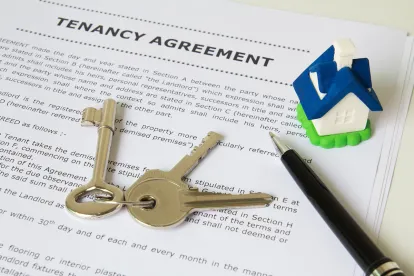What is a Force Majeure Clause?
Force majeure is defined in Merriam-Webster Dictionary an “event or effect that cannot be reasonably anticipated or controlled.” In the context of a commercial lease, a force majeure clause excuses the performance of an obligation by a party when that party is prevented or delayed from performing its obligation due to unforeseeable events outside its reasonable control, but the failure to make monetary payments is not generally not excused. Typically, a force majeure clause in a commercial lease includes several events including “acts of God” defined by Merriam-Webster as the “extraordinary interruption by a natural cause (such as a flood or earthquake) of the usual course of events that experience, prescience, or care cannot reasonably foresee or prevent.”
Fallout from COVID-19.
The COVID-19 pandemic resulted in global supply chain issues, work force scarcity and the downturn in certain industries (e.g., food and beverage, hospitality, brick and mortar retail, etc.), and many tenants and landlords found it either impossible or impractical to perform certain obligations under their leases. For example, landlords had trouble completing the upfit and tenant improvements for their lessees and delivering improved lease spaces on time with material and labor shortages, and tenants grappled with reduced business income related to government-mandated COVID-19 shutdowns, inventory shortages, and the lack of a sufficient workforce. While most commercial leases included a force majeure clause prior to the onset of COVID-19, many clauses did not specifically address a pandemic or the outbreak of virus or disease as a force majeure event. Nonetheless, tenants and landlords in several jurisdictions brought actions arguing that government intervention, including mandated business shutdowns or quarantines, qualified as force majeure events.
Pre-Pandemic Force Majeure Clauses.
The following is an example of a typical force majeure clause found in commercial leases without specific pandemic or epidemic language:
“Unless otherwise specifically provided, in the event that either party hereto shall be delayed or hindered in or prevented from the performance of any act required hereunder by reason of strikes, lock-outs, labor troubles, Act of God, inability to procure materials, failure of power, restrictive governmental laws or regulations, riots, insurrection, war or other reason of a like nature not the fault of the party delayed in performing work or doing acts required under the terms of this Lease (each being referred to herein as “Force Majeure”), then performance of such act shall be excused for period of delay and the period for the performance of any such act shall be extended for a period equivalent to the period of such delay, provided that this subsection will not excuse or delay the payment of money by either party.”
Force Majeure Clauses in reaction to COVID-19.
After the onset of COVID-19, tenants and landlords were forced to rethink what events qualified as force majeure under the lease. To remove any doubt, force majeure clauses were drafted to include specific references to pandemics, epidemics and other events resulting from a health crisis. Further, these clauses have become more robust generally in reaction to the failure of pre-pandemic force majeure clauses to adequately address the disruption to performance under leases by COVID-19. In addition to addressing pandemic-related events, force majeure clauses are now being drafted to encompass a wide array of unpredictable events (see example clause below).
“If Tenant or Landlord is delayed or prevented from performing any of their respective non-monetary obligations under this Lease, and such delay is by reason of strike, lockout, labor troubles, material shortages, adjustment of any insurance claim, failure of power, riots, civil commotion, insurrection, war (whether declared or undeclared), warlike operations, acts of terrorism, cyber-attacks, acts of public enemy, acts of bioterrorism, plagues, epidemics, pandemics, outbreak of a communicable disease leading to extraordinary restrictions including quarantine or movement of people or goods, invasion, rebellion, hostilities, military or usurped power, sabotage, government action, rain and other inclement weather, acts of God, power outages, inability to obtain any material, utility, or service because of governmental restrictions, inability to obtain building permits, hurricanes, floods, earthquakes, tornadoes, or other natural disasters, accident, emergency, mechanical breakdown, municipal delays (including delays in reviewing materials submitted by a party or issuing permits or approvals following such submittals), the act or failure to act of the other party, the default under this Lease by the other party, governmental preemption in connection with a national emergency, any rule, order or regulation of any department or subdivision of any government agency, or any other cause reasonably beyond such party’s control (where lack of funds, inability to obtain financing, and/or changes in economic condition shall not be a basis for delay or prevention of any obligation under this Lease) (any such event, a “Force Majeure”), then performance of such act shall be excused for the period of the delay or prevention, and the period of such delay or prevention shall be deemed added to the time period herein provided for the performance of any such obligation by the party so delayed or prevented, provided that this subsection will not excuse or delay the payment of money by either party.”
The underlined language above primarily captures pandemic-related events, but the reference to “material shortages” or “government action” also included in the clause could similarly apply in the pandemic context.
Conclusion
The COVID-19 pandemic has shown that landlords and tenants should “expect the unexpected” when it comes to events beyond each party’s control. Therefore, landlords and tenants should strongly consider including a broadly drafted force majeure clause in their commercial leases that includes language addressing pandemics and a comprehensive list of other possible occurrences. The parties should also carefully review how these clauses impact their respective performance under the lease.




 />i
/>i

